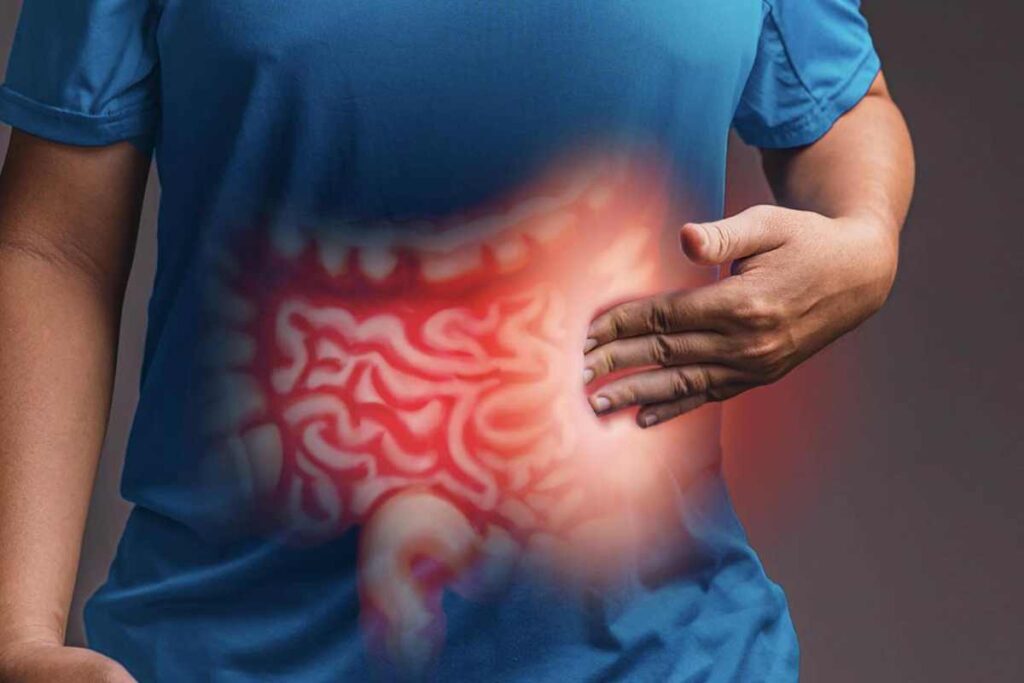Inflammatory Bowel disease (IBD) is a group of duodenal disorders that cause long-term digestive tract inflammation. It may include ulcerative colitis (UC) or Crohn’s disease.
Crohn’s disease and ulcerative colitis include inflammation of the stomach (GI) tract and can cause various symptoms that vary in intensity and duration. Understanding these indications is critical for early diagnosis, effective treatment, and improved quality of life.
Core symptoms of IBD
Abdominal pain and cramping
One of the characteristic symptoms of IBD is abdominal discomfort, often accompanied by cramping. In Crohn’s disease, this pain is usually localized to the lower right side of the abdomen. At the same time, ulcerative colitis may be more generalized or limited to the left side of the abdomen.
The pain is usually the result of inflammation or ulcers in the intestines and can range from mild to severe.
Diarrheal
Diarrheal is a common symptom of Crohn’s disease and ulcerative colitis, especially during flare-ups. It is usually accompanied by an urge to urinate, where the person immediately needs to go to the toilet.
In ulcerative colitis, diarrhea may vary with blood or mucus, although in Crohn’s disease, diarrhea may be accompanied by undigested food particles, depending on the site of inflammation.
Blood in the stool
Blood in the stool is a common symptom, especially in ulcerative colitis. It usually appears as bright red blood or dark, tarry stools, depending on the harshness of the condition and the extent of ulceration. It indicates active inflammation and may be associated with rectal bleeding.
Blood in the stool may also occur with Crohn’s disease, but this is less common and usually occurs when significant damage to the intestines occurs.
Weight loss and malnutrition
Unexplained weight loss is a worrying symptom of IBD. Chronic inflammation interferes with the absorption of nutrients, leading to malnutrition.
This is especially true in Crohn’s disease, where inflammation can touch any part of the gastrointestinal tract, including the small intestine, which is critical in nutrient absorption. Combined with decreased appetite and frequent diarrhea, this can lead to significant weight loss.
Fatigue
Chronic fatigue is a shared symptom in people with IBD. Constant inflammation, nutrient deficiencies, and lack of sleep due to nighttime indications can contribute to feelings of exhaustion.
Fatigue can be further aggravated by anemia due to blood loss or poor iron absorption.
Fever
During active flare-ups, fever is a shared symptom of IBD. It usually indicates systemic inflammation and may be associated with infection if complications such as abscess or fistula formation occur.
Crohn’s disease often causes a persistent low-grade fever, whereas ulcerative colitis may cause higher fever during flare-ups.
Urgency and tenesmus
Tenesmus is the sensation of having to defecate even when the bowel is empty, a common symptom of ulcerative colitis. It can cause frequent and uncontrollable urges to urinate, causing severe discomfort to the patient.
Painful or incomplete bowel movements may accompany this symptom.
Other systems impacted by IBD
Although the main symptoms of IBD affect the gastrointestinal tract, IBD can also cause symptoms and complications affecting other shares of the body.
These may include combined pain, skin rashes, eye irritation (uveitis or episcleritis), and liver disease. Extraintestinal manifestations are shared in patients with IBD and can muddle the diagnosis and treatment of the disease.
The Takeaway
Symptoms of IBD can vary and affect different aspects of a person’s health. The combination of gastrointestinal and extraintestinal symptoms often complicates the course of the disease.
Early detection of IBD signs, such as persistent abdominal pain, looseness, weight loss, and fatigue, can lead to timely treatment and better long-term consequences. If you experience any of these symptoms, it is essential to consult with your healthcare provider for an evaluation and possible treatment options.


